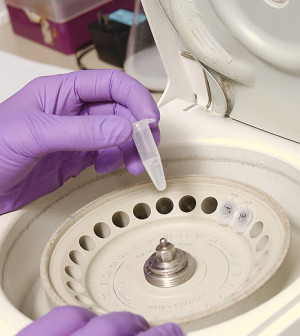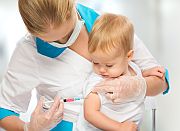- Could Your Grocery Store Meat Be Causing Recurring UTIs?
- Are You Making This Expensive Thermostat Error This Winter?
- Recognizing the Signs of Hypothyroidism
- 10 Strategies to Overcome Insomnia
- Could Artificial Sweeteners Be Aging the Brain Faster?
- Techniques for Soothing Your Nervous System
- Does the Water in Your House Smell Funny? Here’s Why
- Can a Daily Dose of Apple Cider Vinegar Actually Aid Weight Loss?
- 6 Health Beverages That Can Actually Spike Your Blood Sugar
- Treatment Options for Social Anxiety Disorder
Another Study Finds No Vaccine-Autism Link


Yet another study finds no evidence that the measles-mumps-rubella (MMR) vaccine raises the risk of autism — even among children who are at increased genetic risk.
Experts said the findings, reported in the April 21 issue of the Journal of the American Medical Association, should be reassuring to parents, particularly those who already have a child with autism.
The theory that MMR vaccination raises the risk of autism has its roots in a small study done in 1998 — one that was later found to be fraudulent. Since then, numerous international studies have found no evidence that vaccines help trigger autism.
Still, some parents remain worried. And those who already have a child with autism seem even more concerned.
“Research has shown that parents of kids with autism spectrum disorders are more likely to delay vaccinating their younger children,” said Dr. Bryan King, an autism researcher at the University of Washington, in Seattle.
“Basically, they wait until the developmental dust has settled, and it looks like their child will be unaffected (by autism),” said King, who wrote an editorial published with the study.
But delaying recommended vaccinations puts children at risk of potentially serious infections, said Dr. Anjali Jain, the study leader and a researcher at the Lewin Group, a healthcare consulting firm in Falls Church, Va.
She pointed to the United States’ recent measles outbreaks as an example. This year, 162 people have been sickened in outbreaks across 19 states and Washington, D.C., according to the U.S. Centers for Disease Control and Prevention.
Health officials blame the reappearance of the disease, in part, on parents who choose to forgo or delay their children’s vaccinations.
In recent years, the United States has seen a rising rate of autism spectrum disorders, or ASDs — a group of developmental brain disorders that affect children’s behavior and ability to communicate and socialize. The latest federal estimates say one in 68 kids has some form of autism spectrum disorder. They range widely in severity: Some children have relatively mild problems with social interactions, while others are unable to speak and focus on a limited number of repetitive behaviors.
It’s known that genes make certain children more vulnerable to autism — that’s why kids with an affected older sibling are at higher-than-average risk. But environmental factors also have to play a role, experts believe.
One theory, King said, is that it takes a “triple hit” — genes, plus an environmental trigger that strikes during a particular time window in brain development.
But based on years of research, the MMR vaccine is not that trigger, according to health experts. “Every study that’s looked at this, through every strategy they’ve used, has found no signal,” King said.
The new findings are based on insurance records for nearly 96,000 U.S. children with an older brother or sister; 2 percent had an older sibling with an autism spectrum disorder.
Of the children with an affected sibling, 7 percent had an autism spectrum disorder themselves, compared to just under 1 percent of other kids. There was no evidence, though, that the MMR vaccination raised the risk of autism in either group of children, Jain said.
Among kids with an affected sibling, those who’d received one MMR dose by age 2 were actually one-quarter less likely to be diagnosed with an autism spectrum disorder, the study found. The odds were even lower among those who’d received two doses by age 5.
So is the MMR actually “protective” against autism? Probably not, King said. It could be possible that some parents who noticed developmental delays in their babies opted not to vaccinate, for example.
“But we can say that vaccination was not associated with an increased risk in children with or without an affected sibling,” King said.
Jain agreed. “I hope this is reassuring to parents,” she said.
According to King, it’s natural for parents with a child who has autism to want to reduce their younger kids’ risk.
“Everyone believes there have to be environmental factors contributing to the exponential rise we’ve seen in ASDs,” he said. “But we don’t understand what those factors are yet.”
Researchers are finding clues, though. And more and more, they suspect that prenatal brain development is the critical period, King said.
He pointed to one study published just last week. There, researchers found that among more than 322,000 children, the risk of autism was elevated among children whose mothers had pregnancy-related diabetes in the first or second trimester.
It’s not yet clear what that means, King stressed. But, he noted, some of the genes linked to autism are also involved in regulating insulin — the blood-sugar-controlling hormone that goes awry in diabetes.
According to King, studies like that are opening new ideas on the potential environmental risk factors for autism — even as others are “closing the door” on the MMR theory.
More information
The CDC has more on autism spectrum disorders.
Source: HealthDay
Copyright © 2026 HealthDay. All rights reserved.










